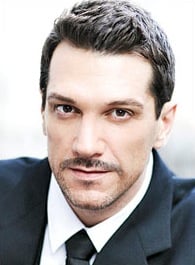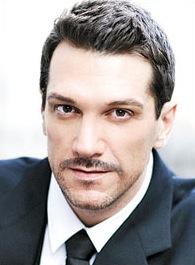
Paulo Szot was already making a name for himself as a baritone in opera circles, but when he was cast in the revival of South Pacific in 2008, the rest of the world took notice of both his singing and his acting. His portrayal of Emile de Becque won him a 2008 Tony Award for Best Actor in a Musical, as well as a legion of fans. Bay Area audiences will have a chance to hear him in one of his favorite roles when the San Francisco Opera presents Carmen in November.
What’s fun about singing the role of Escamillo?
Escamillo has a great meaning in my life. I’ve been singing Carmen for a long, long time — first in the chorus, the second time as Morales, then Zuniga, and then Escamillo. I know the whole male thing. With Escamillo, I thought, This is it, this is what I want to sing.
It’s also special because I debuted the role in Rio de Janeiro, and then made my international debut in the role in New York. So many years doing Carmen!
What are you looking forward to doing if you have any time off in San Francisco?
We are rehearsing a lot. I have heard so much about San Francisco. I have to confess, I didn’t know much. It is so far from Brazil. I had heard the best thing is great wine. When I have some time, I hope to explore the Napa Valley and Sonoma and see with my eyes and taste. The taste surprises you. Once we open, I’ll have two days off so I hope I can get there then.
I’m having a good time here. It’s so beautiful. We arrived and it was so hot. It’s like summer. The city is so beautiful. I had a chance to walk through Golden Gate Park. I love gardens and plants. The first thing I do to explore a city is to go to parks.
What was it like being chosen for the role of Emile de Becque in South Pacific?
South Pacific came at a great moment in my life. I wanted to do something different. I had been singing opera for 12 years. It was great to have a role that was written for an opera singer.
I was in Boston doing The Marriage of Figaro. I took the plane down for the first audition. They showed they were interested. I was looking forward to the conclusion after four or five auditions.
I was happy. I had to cancel some opera concerts that were scheduled, which wasn’t good. But this was something I really wanted to do. A lot of people were against it, but I decided to follow my heart. It was the most beautiful thing. I’ll never regret it. I now say that if you’re faced with a decision, you should follow your heart.
Do you think you’ll want to continue to mix opera and musical theater?
I was bit by the bug. It was a great thing. We did eight shows a week, which is very scary. It’s a lot for an opera singer. It was hard work, physical work. I’ll do it again if the role is right and the time is right.
You played piano and violin and studied ballet, as well as singing, since you were a child. What led you into singing?
It’s my parents. It’s all their fault.
No, they were great. I have two sisters and two brothers, and they sent us to music school before normal school. They were immigrants from Poland and active in the community for the arts. I don’t remember my first performance. I was used to being on stage all the time. I thought the stage was an extension of my living room.
It was another way to elevate my life. Being on stage was fantastic. You get all this support and education. My parents were so supportive. I was dancing and singing. I knew that I loved the stage. I was very shy, but loved being there. I could express what I wanted.
What I wanted most was to dance. I got a scholarship to go to Poland, where my parents were from. I took a cargo ship, two or three days on the ocean. I didn’t have money to get there. I just had money for a place to live and food and the school. I was 18, and my parents said, “We can buy you a cargo ship ticket.” “Thanks, Dad.” It was different and an adventure.
I started to dance. It was hard, hard work. Then I had an injury to my knee. This was during communism in Poland, and the doctors were rude, or straightforward. They told me if I wanted to walk, I had to quit dancing. I decided to walk. Three weeks later, I joined the university chorus. One of the professors said, “You have a really good voice. You should study and be an opera singer.” I thought, Why not?
What are some of your favorite roles so far?
I’ve had great roles. I’m so lucky to be able to repeat roles. You learn so much. You mature, and you see different points and work with new people on stage who have new interpretations. I’ve done Giovannis, a lot of Figaros; I’ve experienced some of the Russian material because of the language similarities to Polish. I did The Nose. That was a fantastic experience for me. I cannot complain.
Do you still play piano and violin?
The violin, absolutely not. I tried, and it was a disaster. I still remembered how to play, but the technique wasn’t there. It was horrible. I’ve decided that’s something I just want to remember that in my past and not try again.
I do still play the piano. When I get a chance, I sit down and play.
What might you have done if you hadn’t been involved in the arts?
I always wanted to be on stage or helping others on stage. If not, my big hobby is gardening and planting. If I weren’t on stage, I would be at my house and planting. I love plants and plants love me. It’s just being on the ground with plants. I’ve always had a communication and close connection with nature.
As an artist, the only thing that charges me is the connection to nature. I love doing it. It’s my main hobby.
What are you listening to these days?
I’m very eclectic. I love what I think is good and hate what I think is bad.
I’m exposed to different music. I’m doing a cabaret show in Orange County after I leave San Francisco. I’ll sing bossa nova, other songs, some musical theater. I do what I like. I’m a singer. I love music of all kinds. I’m very lucky that I can do that — explore all the possibilities. I can do jazz if I want.
There’s a balance, though. I don’t want to be too hard on my voice. It’s hard to say “no.” One of my teachers said the most difficult thing to say is “no,” but it’s the most important. You have to do what’s good for you as a singer.

